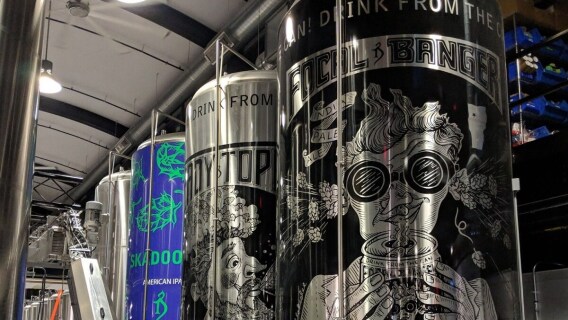The best beers can be hard to find. The best beer stocks can be even harder to find, especially these days. Once, we looked at them differently from alcohol stocks. But the lines have blurred with the spike in sales of hard seltzer and prepared cocktails. Here is a little guide on how to make money investing in beer stocks this year. But first, let me tell you about some of my favorite beers—and when to drink them.
Tough Match-up for Craft Brewers
Every February I play in an annual pond hockey tournament with a group of college friends on Lake Winnipesaukee in New Hampshire. Well, not every February - we took a two-year break due to Covid. But it was back on this past February, thankfully.
We always have mixed results on the ice. But we always have a fridge full of New England’s best beer. And the boys from Idaho always bring an assortment from their part of the country too. Most importantly, we are able to connect every year and share long tales and tasty suds.
[text_ad]
For many years our beer selection was mostly Vermont offerings since that’s where we all went to college. And they were mostly double IPAs (DIPAs).
Over the years things progressed to include more session and super session IPAs, lagers, pilsners, and other varieties. The geographic reach of beers grew too as more became available.
As trends go, we went through the phase when the high-octane IPA boom wound down, the 16-ounce craze blew up, then subsided, and finally the options of “normal” 12-ounce cans of IPAs in the 4.8% to 6.5% alcohol range took up more space in the fridge.
Easy to drink, and easier to get up the next morning, seemed to be the trend. Or at least it was with us.
If I had to narrow down the list of the five most popular craft brewers that we’ve enjoyed over the years, I’d say the two leaders for DIPAs and IPAs remain the Alchemist (Stowe, VT) and Trillium Brewing (Boston, MA).
For other offerings (including a few more IPAs), there are a lot of cans from Tree House Brewing (Charlton, MA), Nightshift (Everett, MA) and Hill Farmstead (Greensboro Bend, VT) leaving the fridge.
In any event, in terms of investment potential, there are still a few ways to invest in the beer industry. But none of the companies mentioned above are publicly traded. And to be perfectly honest, beer isn’t a driving success factor for most of the publicly traded beverage companies right now.
The real growth has been in hard seltzer and prepared cocktails. Though down from the previous two years, prepared cocktail sales grew by 42% in the U.S. last year, while hard seltzer sales improved by 35%.
A concern for brewers is that a lot of the hard seltzer and prepared cocktail growth comes at the cost of beer volumes. This is why diversified beverage companies are rushing to bring new seltzers and cocktails to market. And it’s why none of the publicly traded beer stocks (those that are left) are particularly enticing at the moment.
Boston Beer (SAM) stock is doing poorly (despite growth in hard seltzer), large-cap player Molson Coors (TAP) is doing better since Bud Light ran into trouble with some consumers, and small-cap players like Waterloo Brewing (WBR.TO) are not great.
Thinking big picture, my take is that it’s the packaging players that are winning right now. They are the surest bet as can volume is somewhat insulated from trends in brewers and beverages of choice. These packagers simply capture growth across both old and emerging categories, including beer, energy drinks, hard seltzer, prepared cocktails, etc.
In short, if can growth is up, that’s good for the packagers, regardless of what’s in it.
To put this in crystal clear terms, a recent research note from Bank of America asserts that roughly 70% or so of new beverage SKUs are in cans. That’s a trend. And if you want to be on the right side of it, don’t make life complicated. Go with the packaging companies and, for now, forget about the brewers.
The Best Beer Stocks to Buy Now are the Packagers
Best Beer Stock #1: Ball Corporation (BALL)
Ball Corp (BALL) makes metal packaging products for the beverage, food, and personal care industries. The company is based in Colorado, has a market cap of $18.7 billion and pays a 1.4% dividend. Back in 2016 it acquired Rexam, a U.K.-based competitor, and this combination of the world’s two largest beverage can makers has helped Ball become a bigger and stronger company.
While that acquisition closed years ago, the pitched benefits are being enjoyed now. Part of that pitch was that Ball could achieve hundreds of millions of dollars in annual synergies, aggressively pay down debt, buy back shares, and hike its dividend. With the stock having performed well since the Rexam deal closed, it appears the acquisition was a good move.
Competition is fierce in this industry, but Ball is a market leader and with all the new beverage options out there the company has recently begun to grow again.
One of the reasons the stock is poised for growth has nothing to do with beer. It is because sales of non-alcoholic beverages are so strong and because the tide is flowing away from plastic and glass and toward cans. Beverage lines used to be around one-third cans. Now, it’s two-thirds.
Also, Ball has seen the North American beverage can market evolve. It was once roughly 66% alcoholic and 34% non-alcoholic. That split is closer to 60%/40% now thanks to growth in energy drinks and other categories.
Within alcoholic drinks, Ball is seeing a lot of growth from spiked seltzer, which makes up around 5% of current volume.
Bottom line – cans are where it’s at and Ball has them. On the downside, it could use more of them. Capacity constraints are curbing growth.
Still, looking out a few years it seems Ball is sitting pretty.
Best Beer Stock #2: Crown Holdings (CCK)
Pennsylvania-based Crown Holdings (CCK) makes steel and aluminum cans and metal caps for the food and beverage and household and consumer products markets. The company has a market cap of just over $11 billion.
As with Ball, the current attraction is that Crown offers exposure to growth in sales of beverage cans. There’s more going on behind the scenes with respect to new projects, operational improvements and other initiatives that should keep modest growth intact and offer some margin improvement, but for our purposes, it’s really all about the cans right now.
As if to drive that point home, Crown Holdings recently sold off a major part of its non-beverage-related business. The European Tinplate business, which brought in $2.3 billion in 2020 (21% of total revenue), was recently sold to KPS Capital Partners for $2.3 billion. Divesting the business, which focused on food cans, aerosol cans, metal closures, etc., will allow Crown to pay down debt, return money to shareholders and invest in more growth-oriented areas of the business (i.e. beverage cans).
While production capacity has been constrained of late, growth should accelerate as those constraints fall off. Couple that with higher orders from customers (management said global beverage can volume should grow just above 10%), a new southwestern U.S. plant opening in 2023 (one in Kentucky just opened too), and what management sees as “no shortage” of new beverage product ideas, you have a very bullish outlook for the next few years.
I don’t cover either BLL or CCK in Cabot Small-Cap Confidential or Cabot Early Opportunities since these aren’t exactly early-stage or small-cap stocks. Still, they’re interesting stories that I think can fit in a lot of investor portfolios, especially right now.
To find out what small-cap stocks have made the cut for Cabot Small-Cap Confidential, grab a subscription today. And if you’re more into the early-stage ideas, check out Cabot Early Opportunities. Both portfolios are chock full of profit-making growth stocks.
Which beer stocks do you invest in?
[author_ad]
*This post has been updated from an original version, published in 2017.

